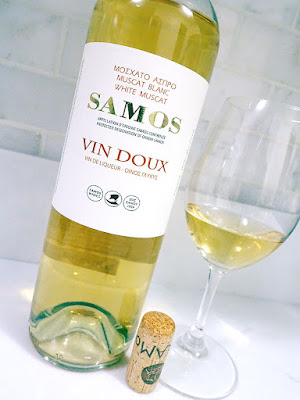wine review is a delectably sweet fortified wine from the Island of Samos in Greece that made its inaugural arrival at the LCBO in last weekend's LCBO VINTAGES New Release Collection.
It is produced by United Winemaking Agricultural Cooperative of Samos (UWC Samos), one of the oldest cooperative wineries in Greece as it was founded in 1934. UWC Samos is also one of Greece's biggest wineries, composed of more than 2,200 producers participating in the Cooperative as members.
The Cooperative was formed after actions taken by the vine growers of the island in 1934, and has proved that the alliance was a strategically important move that helped the preservation of viticulture on the island, as well as the protection of the producers' income. As a cooperative, the principal objective of UWC Samos is to advance the economic and social conditions of its member vine growers and, in general, the Samian society. UWC Samos receives the grapes, produces the wine, and trades almost the entire production of the island through their modern wineries in Malagari (the capital of the island) and Karlovassi (the second-biggest town). In a harmonious combination with traditional viticulture and winemaking, UWC Samos is in constant search for modernization while investing in technology and know-how. The wines of Samos have received hundreds of distinctions at international competitions and fairs over the years, with the very first award received in 1937.
While Somas Muscat wines of Protected Designation of Origin Samos (or PDO Samos) are one of the oldest origin-controlled appellations in Europe, the history of viticulture on the island goes back much further. When one thinks of Samos vineyards, the word's mythology, history, and the name of "Ampelos" (Vine) for one of the two mountain ranges that dominate the island come to mind. The history of Samos wine dates back to early antiquity, while legend says that Dionysus (the god of wine) taught the Samians all about winegrowing and winemaking in order to thank them for their help in defeating the Amazons. According to tradition, the first person to teach winegrowing to the inhabitants of the island was the hero of the Argonauts, Agkaios. There are also historical references in antiquity that reference the wines of Samos in the writings of Hippocrates, Galenos, and Theophrastos, while "Samena" military ships transported wine in amphorae with a pointed base from Samos to various ports in other parts of the globe. References to Samos wine are also found during the Byzantine period, when a traveller clergyman visited the island in 741 AD.
A turbulent history on the island culminated in the almost complete desolation of the land during the 15th century, which resulted in the abandonment of the vineyards as natives lived in hiding in inaccessible mountain areas. Fortunately, Samos was recolonized a century later with people arriving from all parts of Greece, and the history of Muscat wines on the Island of Samos begins again. During the Ottoman occupation and after 1562, European forces appear to be commercially interested in the wines of Samos and setup Consulates on the island for this purpose. Samos' wines were noted by French and German travellers during the 18th century, and in the 19th century, Samos was supplying branded wines to the east and west, while the Catholic Church granted Samos the privilege of producing wine certified by the Catholic Mission.
In 2016, UWC Samos formed a strategic alliance with Greek Wine Cellars to further the commercial development of the award-winning Samos wines, with the aim of strengthening its position in domestic and international markets.
As a fortified wine, the Samos Vin Doux falls under the Vins de Liqueurs category. Not only is it the most popular wine of Samos, this wine is also the No. 1 selling sweet wine in Greece. It is crafted using the indigenous White Muscat of Samos, the grape that reigns king on the island. It was grown on semi-mountainous and mountainous terraces that are influenced by the sun and the Aegean winds. Let's see how this Vin de Liqueur from Samos is tasting tonight...
Attractive, medium-high intensity nose of dried apricot, orange marmalade, peach, and honey aromas with a touch of golden raisin. It's mid-weighted on the palate with a sweet and spicy flavour profile of dried apricot, peach, orange zest, honey, and raisin replays, plus butterscotch and caramel flavours adding further complexity. It has well-balanced acidity, along with some warmth on the mid-palate, while notes of dried apricot, orange zest, caramel, and touches of vanilla linger on the long, delicious finish. Really sings after a nice chill. Highly recommended buy! Score: 90+ pts
Small quantities of other fine wines by UWC Samos are available at the LCBO, while the entire range can be ordered through their Agent - Kolonaki Fine Wines & Spirits.
It is produced by United Winemaking Agricultural Cooperative of Samos (UWC Samos), one of the oldest cooperative wineries in Greece as it was founded in 1934. UWC Samos is also one of Greece's biggest wineries, composed of more than 2,200 producers participating in the Cooperative as members.
The Cooperative was formed after actions taken by the vine growers of the island in 1934, and has proved that the alliance was a strategically important move that helped the preservation of viticulture on the island, as well as the protection of the producers' income. As a cooperative, the principal objective of UWC Samos is to advance the economic and social conditions of its member vine growers and, in general, the Samian society. UWC Samos receives the grapes, produces the wine, and trades almost the entire production of the island through their modern wineries in Malagari (the capital of the island) and Karlovassi (the second-biggest town). In a harmonious combination with traditional viticulture and winemaking, UWC Samos is in constant search for modernization while investing in technology and know-how. The wines of Samos have received hundreds of distinctions at international competitions and fairs over the years, with the very first award received in 1937.
While Somas Muscat wines of Protected Designation of Origin Samos (or PDO Samos) are one of the oldest origin-controlled appellations in Europe, the history of viticulture on the island goes back much further. When one thinks of Samos vineyards, the word's mythology, history, and the name of "Ampelos" (Vine) for one of the two mountain ranges that dominate the island come to mind. The history of Samos wine dates back to early antiquity, while legend says that Dionysus (the god of wine) taught the Samians all about winegrowing and winemaking in order to thank them for their help in defeating the Amazons. According to tradition, the first person to teach winegrowing to the inhabitants of the island was the hero of the Argonauts, Agkaios. There are also historical references in antiquity that reference the wines of Samos in the writings of Hippocrates, Galenos, and Theophrastos, while "Samena" military ships transported wine in amphorae with a pointed base from Samos to various ports in other parts of the globe. References to Samos wine are also found during the Byzantine period, when a traveller clergyman visited the island in 741 AD.
A turbulent history on the island culminated in the almost complete desolation of the land during the 15th century, which resulted in the abandonment of the vineyards as natives lived in hiding in inaccessible mountain areas. Fortunately, Samos was recolonized a century later with people arriving from all parts of Greece, and the history of Muscat wines on the Island of Samos begins again. During the Ottoman occupation and after 1562, European forces appear to be commercially interested in the wines of Samos and setup Consulates on the island for this purpose. Samos' wines were noted by French and German travellers during the 18th century, and in the 19th century, Samos was supplying branded wines to the east and west, while the Catholic Church granted Samos the privilege of producing wine certified by the Catholic Mission.
In 2016, UWC Samos formed a strategic alliance with Greek Wine Cellars to further the commercial development of the award-winning Samos wines, with the aim of strengthening its position in domestic and international markets.
As a fortified wine, the Samos Vin Doux falls under the Vins de Liqueurs category. Not only is it the most popular wine of Samos, this wine is also the No. 1 selling sweet wine in Greece. It is crafted using the indigenous White Muscat of Samos, the grape that reigns king on the island. It was grown on semi-mountainous and mountainous terraces that are influenced by the sun and the Aegean winds. Let's see how this Vin de Liqueur from Samos is tasting tonight...
Tasting Note:
SAMOS VIN DOUX WHITE MUSCAT - PDO Samos, Greece (#44578) (S) - $15.95Attractive, medium-high intensity nose of dried apricot, orange marmalade, peach, and honey aromas with a touch of golden raisin. It's mid-weighted on the palate with a sweet and spicy flavour profile of dried apricot, peach, orange zest, honey, and raisin replays, plus butterscotch and caramel flavours adding further complexity. It has well-balanced acidity, along with some warmth on the mid-palate, while notes of dried apricot, orange zest, caramel, and touches of vanilla linger on the long, delicious finish. Really sings after a nice chill. Highly recommended buy! Score: 90+ pts
Small quantities of other fine wines by UWC Samos are available at the LCBO, while the entire range can be ordered through their Agent - Kolonaki Fine Wines & Spirits.








